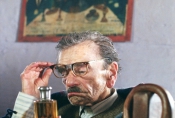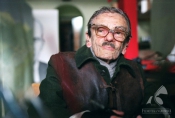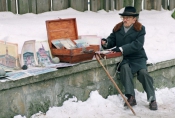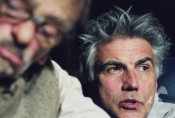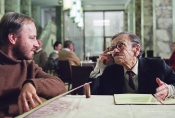MY NIKIFOR [2004]
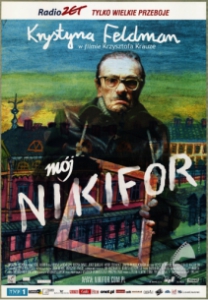
year:
- 2004
runtime:
- 96 min
directed by:
- Krzysztof Krauze
written by:
- Joanna Kos, Krzysztof Krauze
director of photography:
- Krzysztof Ptak
cast:
- Krystyna Feldman [Nikifor], Roman Gancarczyk [Marian Włosiński], Jerzy Gudejko [Ryszard Nowak, head of the holiday resort], Jowita Miondlikowska [Kowalska, cleaner at the Old House], Lucyna Malec [Hanna Włosińska, Marian’s wife]
music by:
- Bartłomiej Gliniak
produced by:
- Studio Filmowe Zebra, Telewizja Polska – Agencja Filmowa, Canal+ Polska
producer:
- Juliusz Machulski
awards:
-
• Gdynia Film Festival 2004 – award for Krystyna Feldman for the best female actor in a leading role
• Gdynia Film Festival 2004 – award for Dorota Roqueplo for costumes
• Gdynia Film Festival 2004 – award for Krzysztof Szpetmański for editing
• Eagle (Polish Film Award) 2005 – award for Krzysztof Ptak for the best photography in 2004
• Eagle (Polish Film Award) 2005 – award for Magdalena Dipont for best production design in 2004
• Eagle (Polish Film Award) 2005 – award for Krystyna Feldman for the best female actor in a leading role 2004
• Golden Duck (awarded by "Film" magazine) 2005 for Krystyna Feldman for the best female actor in a leading role in 2004
• Karlovy Vary (MFF) 2005 – Main Prize "Cristal Globe"
• Karlovy Vary (MFF) 2005 – Cristal Globe" for Krzysztof Krauze for best director
• Karlovy Vary (MFF) 2005 – for Krystyna Feldman for the best female actor
• Karlovy Vary (MFF) 2005 – "Don Kichot", FICC award
About the film
It is 1960 in the town of Krynica. Nikifor enters Włosiński‘s studio and unpacks his painterly paraphernalia.
Włosiński’s life, up to this point quiet, regulated, and planned to the last detail, is disturbed. Włosiński tries to get rid of his annoying guest. He decides to find Nikifor’s family. It turns out that Nikifor lives on his own, in a rented room, he doesn’t even have a birth certificate. From a legal point of view, he does not exist. Włosiński only manages to establish that he had a mute mother (father was unknown, although rumour has it that he was the famous Polish painter, Gierymski).
Włosiński is not an enthusiast of folk painting. As he gets to know Nikifor better, he begins to appreciate his work. He sees Nikifor’s fervent faith as well as his spiritual freedom. He discovers that it is manifested in painting by Nikifor’s independence from the opinion of others, and in life – in his detachment from worldliness and his profound humility. Włosiński sees how he himself is restricted by his painterly education – he is overly attached to painting tradition, as well as assessments and judgments, his dreams of success and of material stability.
It comes to light that Nikifor is suffering from tuberculosis. Sharing a studio with him, Włosiński risks not only his own life but also puts his own family in danger.
Nikifor does not want to go to hospital, he wants to paint. Włosiński tries to force him to undergo treatment so he becomes Nikifor’s legal custodian. Upon hearing the news, his wife and children move to Krakow, regardless of Włosiński’s desperate pleas that Nikifor is dying and it will only be for a few months.
It is 1967. It has been 7 years. Nikifor is still alive. We meet Włosiński and Nikifor on the eve of Nikifor’s greatest triumph – a large retrospective exhibition at Warsaw’s "Zacheta" gallery (which comes a bit late, because at that time Nikifor already ranks among the five most prominent "naive" artists in the world). We see how Włosiński’s life has changed. He has given up his own artistic ambitions. The meaning of his life is now to look after the genius painter. The price has been losing his family.
Several months have passed. Włosiński sits at the bedside of the dying Nikifor. Włosiński’s wife arrives – perhaps this is the beginning of reconciliation between them.
